Educational Leadership: Reflection on Influences and Future Goals
VerifiedAdded on 2022/08/10
|5
|1241
|20
Essay
AI Summary
This essay provides a personal reflection on the author's journey and aspirations as an educational leader. The author, with 10 years of experience in education, discusses their understanding of effective leadership, emphasizing self-awareness, communication skills, and the importance of leading by example. The essay highlights the influence of Sir Kenneth Robinson's philosophy on promoting creativity in education and the author's commitment to fostering creative activities in the classroom. It also explores the author's belief in supportive, fair, and motivating leadership, drawing from their experiences as a learner and their desire to create a positive learning environment where students feel safe to take risks and express their ideas. The author aims to inspire students and encourage their creative sides, using their past experiences to guide their future actions as an educational leader.
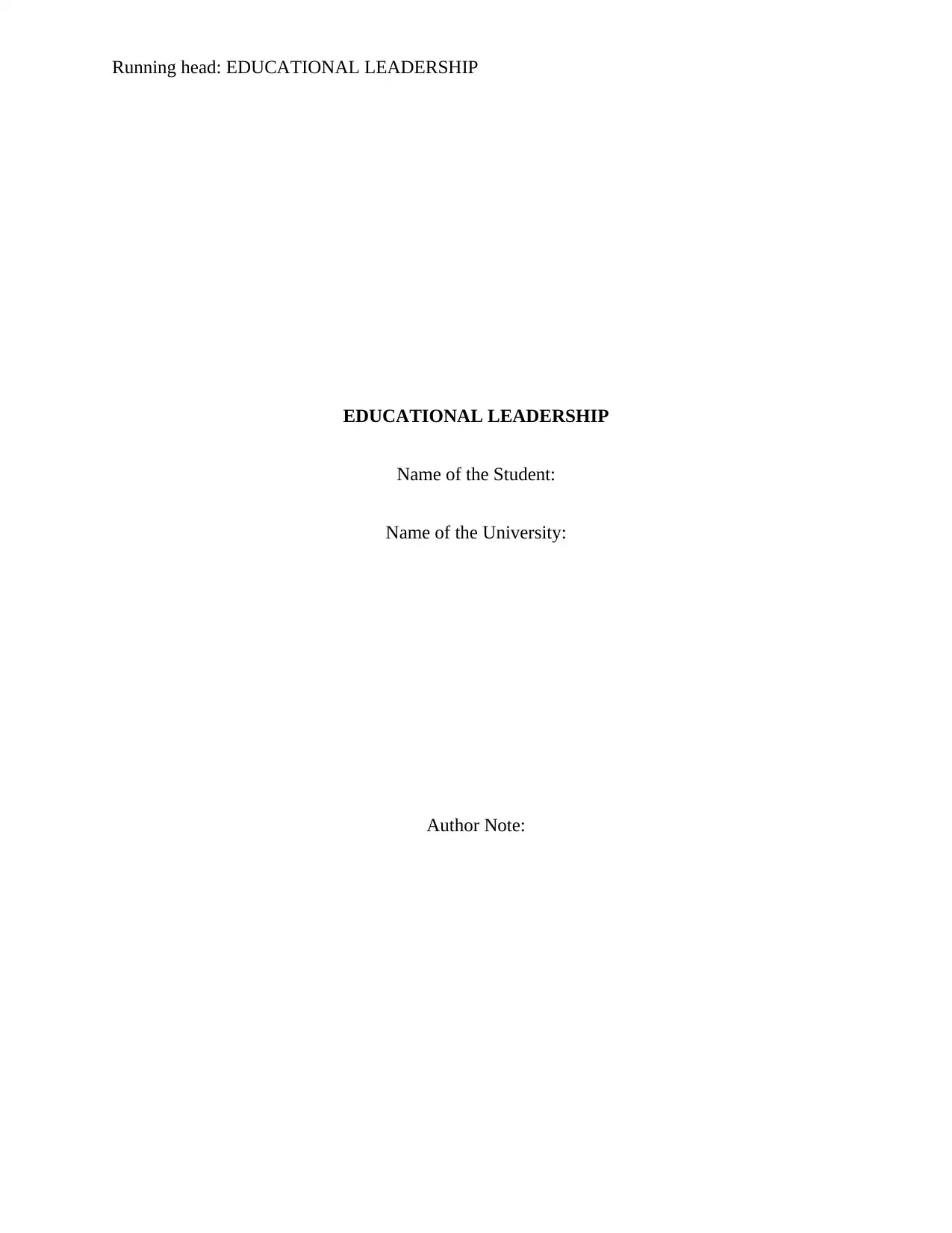
Running head: EDUCATIONAL LEADERSHIP
EDUCATIONAL LEADERSHIP
Name of the Student:
Name of the University:
Author Note:
EDUCATIONAL LEADERSHIP
Name of the Student:
Name of the University:
Author Note:
Paraphrase This Document
Need a fresh take? Get an instant paraphrase of this document with our AI Paraphraser
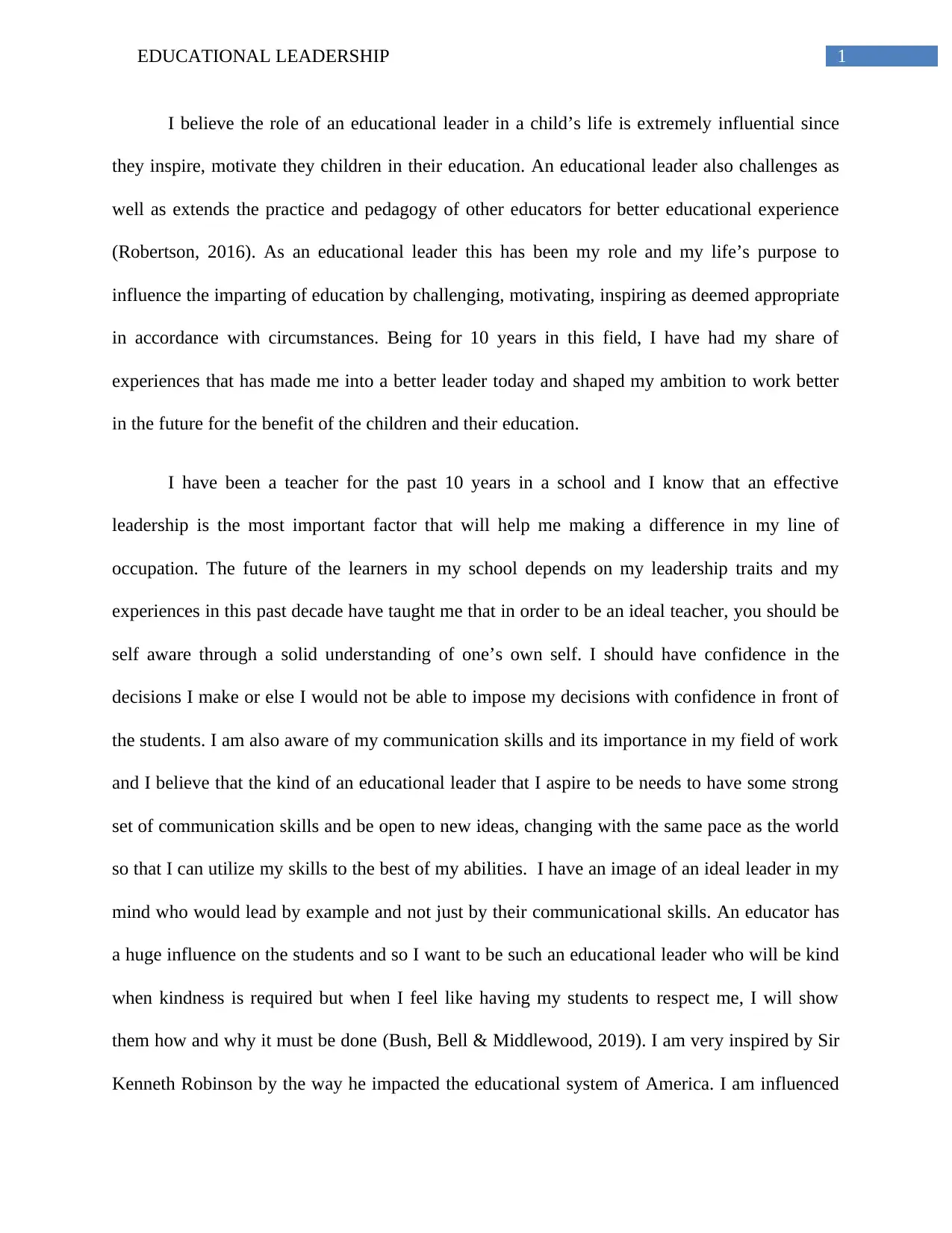
1EDUCATIONAL LEADERSHIP
I believe the role of an educational leader in a child’s life is extremely influential since
they inspire, motivate they children in their education. An educational leader also challenges as
well as extends the practice and pedagogy of other educators for better educational experience
(Robertson, 2016). As an educational leader this has been my role and my life’s purpose to
influence the imparting of education by challenging, motivating, inspiring as deemed appropriate
in accordance with circumstances. Being for 10 years in this field, I have had my share of
experiences that has made me into a better leader today and shaped my ambition to work better
in the future for the benefit of the children and their education.
I have been a teacher for the past 10 years in a school and I know that an effective
leadership is the most important factor that will help me making a difference in my line of
occupation. The future of the learners in my school depends on my leadership traits and my
experiences in this past decade have taught me that in order to be an ideal teacher, you should be
self aware through a solid understanding of one’s own self. I should have confidence in the
decisions I make or else I would not be able to impose my decisions with confidence in front of
the students. I am also aware of my communication skills and its importance in my field of work
and I believe that the kind of an educational leader that I aspire to be needs to have some strong
set of communication skills and be open to new ideas, changing with the same pace as the world
so that I can utilize my skills to the best of my abilities. I have an image of an ideal leader in my
mind who would lead by example and not just by their communicational skills. An educator has
a huge influence on the students and so I want to be such an educational leader who will be kind
when kindness is required but when I feel like having my students to respect me, I will show
them how and why it must be done (Bush, Bell & Middlewood, 2019). I am very inspired by Sir
Kenneth Robinson by the way he impacted the educational system of America. I am influenced
I believe the role of an educational leader in a child’s life is extremely influential since
they inspire, motivate they children in their education. An educational leader also challenges as
well as extends the practice and pedagogy of other educators for better educational experience
(Robertson, 2016). As an educational leader this has been my role and my life’s purpose to
influence the imparting of education by challenging, motivating, inspiring as deemed appropriate
in accordance with circumstances. Being for 10 years in this field, I have had my share of
experiences that has made me into a better leader today and shaped my ambition to work better
in the future for the benefit of the children and their education.
I have been a teacher for the past 10 years in a school and I know that an effective
leadership is the most important factor that will help me making a difference in my line of
occupation. The future of the learners in my school depends on my leadership traits and my
experiences in this past decade have taught me that in order to be an ideal teacher, you should be
self aware through a solid understanding of one’s own self. I should have confidence in the
decisions I make or else I would not be able to impose my decisions with confidence in front of
the students. I am also aware of my communication skills and its importance in my field of work
and I believe that the kind of an educational leader that I aspire to be needs to have some strong
set of communication skills and be open to new ideas, changing with the same pace as the world
so that I can utilize my skills to the best of my abilities. I have an image of an ideal leader in my
mind who would lead by example and not just by their communicational skills. An educator has
a huge influence on the students and so I want to be such an educational leader who will be kind
when kindness is required but when I feel like having my students to respect me, I will show
them how and why it must be done (Bush, Bell & Middlewood, 2019). I am very inspired by Sir
Kenneth Robinson by the way he impacted the educational system of America. I am influenced
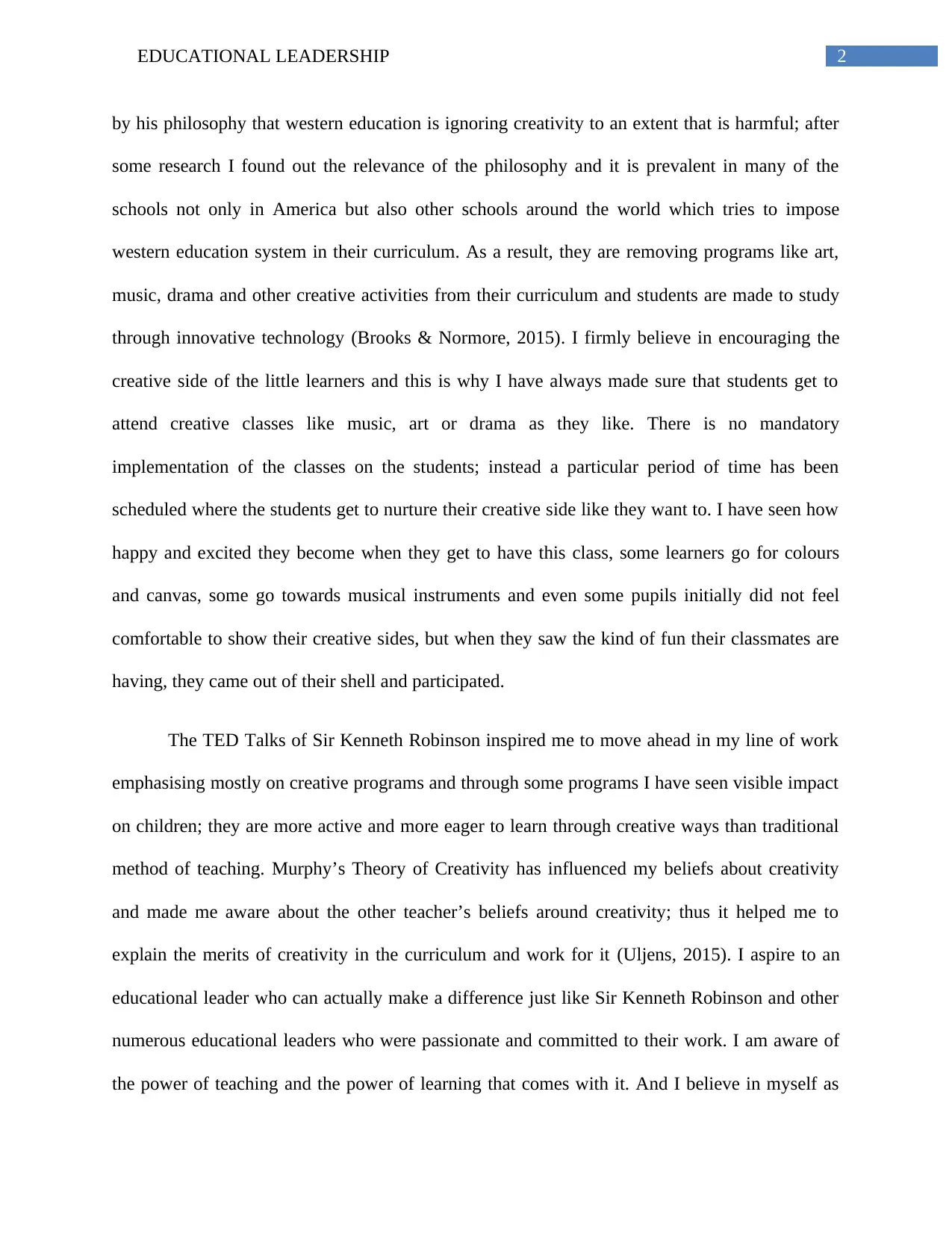
2EDUCATIONAL LEADERSHIP
by his philosophy that western education is ignoring creativity to an extent that is harmful; after
some research I found out the relevance of the philosophy and it is prevalent in many of the
schools not only in America but also other schools around the world which tries to impose
western education system in their curriculum. As a result, they are removing programs like art,
music, drama and other creative activities from their curriculum and students are made to study
through innovative technology (Brooks & Normore, 2015). I firmly believe in encouraging the
creative side of the little learners and this is why I have always made sure that students get to
attend creative classes like music, art or drama as they like. There is no mandatory
implementation of the classes on the students; instead a particular period of time has been
scheduled where the students get to nurture their creative side like they want to. I have seen how
happy and excited they become when they get to have this class, some learners go for colours
and canvas, some go towards musical instruments and even some pupils initially did not feel
comfortable to show their creative sides, but when they saw the kind of fun their classmates are
having, they came out of their shell and participated.
The TED Talks of Sir Kenneth Robinson inspired me to move ahead in my line of work
emphasising mostly on creative programs and through some programs I have seen visible impact
on children; they are more active and more eager to learn through creative ways than traditional
method of teaching. Murphy’s Theory of Creativity has influenced my beliefs about creativity
and made me aware about the other teacher’s beliefs around creativity; thus it helped me to
explain the merits of creativity in the curriculum and work for it (Uljens, 2015). I aspire to an
educational leader who can actually make a difference just like Sir Kenneth Robinson and other
numerous educational leaders who were passionate and committed to their work. I am aware of
the power of teaching and the power of learning that comes with it. And I believe in myself as
by his philosophy that western education is ignoring creativity to an extent that is harmful; after
some research I found out the relevance of the philosophy and it is prevalent in many of the
schools not only in America but also other schools around the world which tries to impose
western education system in their curriculum. As a result, they are removing programs like art,
music, drama and other creative activities from their curriculum and students are made to study
through innovative technology (Brooks & Normore, 2015). I firmly believe in encouraging the
creative side of the little learners and this is why I have always made sure that students get to
attend creative classes like music, art or drama as they like. There is no mandatory
implementation of the classes on the students; instead a particular period of time has been
scheduled where the students get to nurture their creative side like they want to. I have seen how
happy and excited they become when they get to have this class, some learners go for colours
and canvas, some go towards musical instruments and even some pupils initially did not feel
comfortable to show their creative sides, but when they saw the kind of fun their classmates are
having, they came out of their shell and participated.
The TED Talks of Sir Kenneth Robinson inspired me to move ahead in my line of work
emphasising mostly on creative programs and through some programs I have seen visible impact
on children; they are more active and more eager to learn through creative ways than traditional
method of teaching. Murphy’s Theory of Creativity has influenced my beliefs about creativity
and made me aware about the other teacher’s beliefs around creativity; thus it helped me to
explain the merits of creativity in the curriculum and work for it (Uljens, 2015). I aspire to an
educational leader who can actually make a difference just like Sir Kenneth Robinson and other
numerous educational leaders who were passionate and committed to their work. I am aware of
the power of teaching and the power of learning that comes with it. And I believe in myself as
⊘ This is a preview!⊘
Do you want full access?
Subscribe today to unlock all pages.

Trusted by 1+ million students worldwide
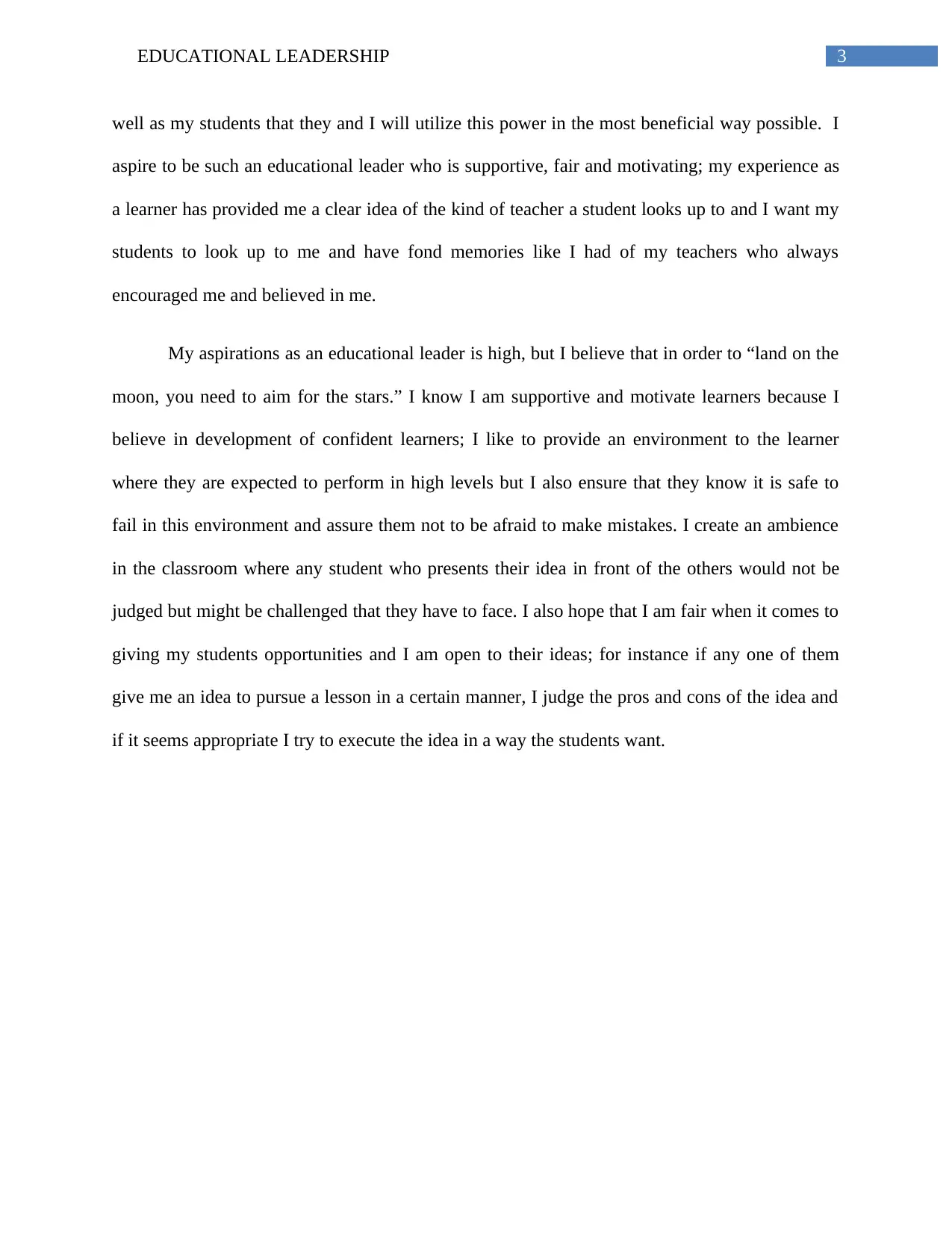
3EDUCATIONAL LEADERSHIP
well as my students that they and I will utilize this power in the most beneficial way possible. I
aspire to be such an educational leader who is supportive, fair and motivating; my experience as
a learner has provided me a clear idea of the kind of teacher a student looks up to and I want my
students to look up to me and have fond memories like I had of my teachers who always
encouraged me and believed in me.
My aspirations as an educational leader is high, but I believe that in order to “land on the
moon, you need to aim for the stars.” I know I am supportive and motivate learners because I
believe in development of confident learners; I like to provide an environment to the learner
where they are expected to perform in high levels but I also ensure that they know it is safe to
fail in this environment and assure them not to be afraid to make mistakes. I create an ambience
in the classroom where any student who presents their idea in front of the others would not be
judged but might be challenged that they have to face. I also hope that I am fair when it comes to
giving my students opportunities and I am open to their ideas; for instance if any one of them
give me an idea to pursue a lesson in a certain manner, I judge the pros and cons of the idea and
if it seems appropriate I try to execute the idea in a way the students want.
well as my students that they and I will utilize this power in the most beneficial way possible. I
aspire to be such an educational leader who is supportive, fair and motivating; my experience as
a learner has provided me a clear idea of the kind of teacher a student looks up to and I want my
students to look up to me and have fond memories like I had of my teachers who always
encouraged me and believed in me.
My aspirations as an educational leader is high, but I believe that in order to “land on the
moon, you need to aim for the stars.” I know I am supportive and motivate learners because I
believe in development of confident learners; I like to provide an environment to the learner
where they are expected to perform in high levels but I also ensure that they know it is safe to
fail in this environment and assure them not to be afraid to make mistakes. I create an ambience
in the classroom where any student who presents their idea in front of the others would not be
judged but might be challenged that they have to face. I also hope that I am fair when it comes to
giving my students opportunities and I am open to their ideas; for instance if any one of them
give me an idea to pursue a lesson in a certain manner, I judge the pros and cons of the idea and
if it seems appropriate I try to execute the idea in a way the students want.
Paraphrase This Document
Need a fresh take? Get an instant paraphrase of this document with our AI Paraphraser
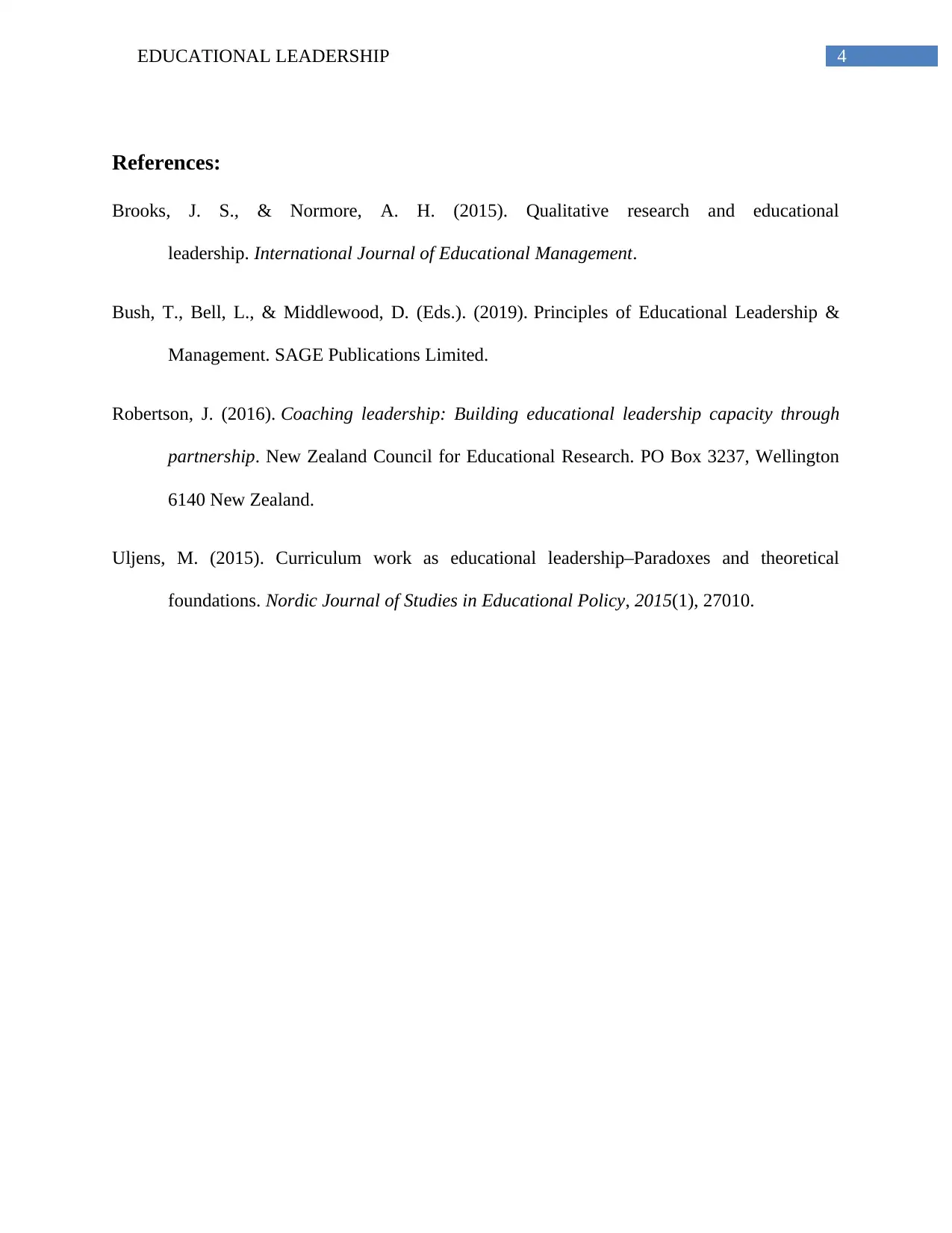
4EDUCATIONAL LEADERSHIP
References:
Brooks, J. S., & Normore, A. H. (2015). Qualitative research and educational
leadership. International Journal of Educational Management.
Bush, T., Bell, L., & Middlewood, D. (Eds.). (2019). Principles of Educational Leadership &
Management. SAGE Publications Limited.
Robertson, J. (2016). Coaching leadership: Building educational leadership capacity through
partnership. New Zealand Council for Educational Research. PO Box 3237, Wellington
6140 New Zealand.
Uljens, M. (2015). Curriculum work as educational leadership–Paradoxes and theoretical
foundations. Nordic Journal of Studies in Educational Policy, 2015(1), 27010.
References:
Brooks, J. S., & Normore, A. H. (2015). Qualitative research and educational
leadership. International Journal of Educational Management.
Bush, T., Bell, L., & Middlewood, D. (Eds.). (2019). Principles of Educational Leadership &
Management. SAGE Publications Limited.
Robertson, J. (2016). Coaching leadership: Building educational leadership capacity through
partnership. New Zealand Council for Educational Research. PO Box 3237, Wellington
6140 New Zealand.
Uljens, M. (2015). Curriculum work as educational leadership–Paradoxes and theoretical
foundations. Nordic Journal of Studies in Educational Policy, 2015(1), 27010.
1 out of 5
Related Documents
Your All-in-One AI-Powered Toolkit for Academic Success.
+13062052269
info@desklib.com
Available 24*7 on WhatsApp / Email
![[object Object]](/_next/static/media/star-bottom.7253800d.svg)
Unlock your academic potential
Copyright © 2020–2026 A2Z Services. All Rights Reserved. Developed and managed by ZUCOL.





